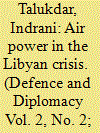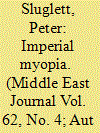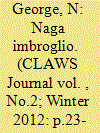| Srl | Item |
| 1 |
ID:
119641


|
|
|
|
|
| Publication |
2013.
|
| Summary/Abstract |
Looking at the past century, it is possible to identify two eras of distinct international relationships between states: (1) the bipolar system (during the cold war); and (2) the unipolar or multipolar system (at present). This change of the international order has also produced a change in the way the use of force is seen in solving economic, ideological, or ethnic problems. The vacuume created with the dissolution of one of the two superpowers (USSR)-a vacuum not covered by the remaining superpower-has de facto opened the way to the proliferation of small wars. But even if small wars do not represent an immediate threat for most Western countries, prolonged small wars can jeopardise the international order. Apart from wars in the conventional and traditional way, unconventional warfare like civil war, ethnicwar, religious war, guerrilla warfare, terrorism, etc within a state also has the equal potential to endanger the international security. The Libyan crisis which saw the end of a dictatorial regime had such potential.
|
|
|
|
|
|
|
|
|
|
|
|
|
|
|
|
| 2 |
ID:
092624


|
|
|
|
|
| Publication |
2009.
|
| Summary/Abstract |
This article tries to chart some of the parallels between the British Mesopotamia Campaign in the First World War and the US invasion of Iraq in 2003. Both campaigns were justified by faulty or contrived intelligence; both were launched with little consideration of the future potential needs of the liberated/occupied territory; and both were characterized by a lack of planning and clear objectives. However, in spite of their obvious paternalism, several military and civilian members of the British-Indian expedition had a fair understanding of the Middle East, Arabic, Islam, tribal society, and so on; this sort of expertise was almost completely absent both among those planning, and among those running, the US invasion of 2003.
|
|
|
|
|
|
|
|
|
|
|
|
|
|
|
|
| 3 |
ID:
118481


|
|
|